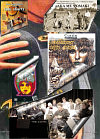Alexandria Virtual Cultural Centre of WA
Kindleberger to Cohen, April 5, 1946
Memoranda, 1946; State Department File; Charles P. Kindleberger Papers.
G - Mr. Cohen April 5, 1946
GA - Mr. C. P. Kindleberger
l have reflected on our discussion of Monday concerning the role of the element of power in our European diplomacy. I take it to be your position that our present program of piecemeal negotiation is likely to produce, over a period of time, a European settlement more satisfactory then any that might result from an Immediate effort to set forth and agree broad terms for a united Europe, combined with proposed settlement, within those terms, of the major outstanding issues.
In the light of your judgment I have reviewed the major issues that fall within the knowledge of GA. They include, I believe, a substantial proportion of our outstanding major European problems, and appear to reflect faithfully the nature of the forces now at work in Europe.
In the light of that review I would submit to you again the
following observations:
1. Both USSR and UK, as well as France. are now proceeding on the assumption that Europe will, in fact, split, and they assume this in large part because they feel the US interest in the European structure is transitory.
2. This assumption tends to maximize the power element in every European issue no matter hov inconsequential.
3. In terms of this assumption the US struggle to achieve some degree of independence for Austria, by opposing USSR infiltration, its program of protest and obstruction, where possible in Eastern Europe, can only appear to USSR as part of a long-run effort to corrupt the East European bloc. It is significant that a Russian is recently reported to have remarked that our protest against USSR economic policy in Eastern Europe is judged in Moscow as an effort to preserve markets and economic influence for Germany. Although US policy In fact may be motivated by a conception of independence within the UNO, as a substitute for the older tradition of East Europe as a satellite area to a major power nothing In the present organisation of the UNO offers the guarantee that exclusive blocs will not form in Europe, and very little of US diplomatic action In Europe could be interpreted as offering a realistic alternative to blocs. It is significant that USSR interpreted our delay in decision over the Rhinsland-Ruhr as tacit connivance in a Western bloc conception; and that the UK regards the compromises we forced on them to achieve agreement on the level of industry as a romantic concession to the Eastern bloc.
4. In fact, to the extent that US policy can be distinguished from UK policy in Europe, that distinction arises from the One Europe assumption that characterized Yalta and parts of the Potsdam Agreement. It seams clear to us, In the light of the character of day-to-day diplomacy that we must either re-assert our faith in a European solution, other than relatively exclusive blocs; or we must. increasingly, find ourselves, de facto, in support of the British bloc conception.
5. We recognize, of course, that the type of diplomatic offensive we advocate would be subjected to the most intense and suspicious scrutiny, not only by the UK, but also by France, and the USSR. Its terms would have to be drafted in such a way that, initially, they would involve no relative surrender, by East or West; but rather equal surrender to the larger forum. Over a period of time, it would be the hope that the power or security element, within such a forum would diminish, by a succession of equal withdrawals. To the West the guarantee of US participation and to the East the assertion of US interest might well make this solution acceptable. We appreciate that the tactics of diplomacy required, including prior consultation at a high level with USSR and UK would be fairly delicate.
6. In short, we doubt that the present array of negotiations In Europe - against a background of assumed split, with no operating tie-up to the UNO machinery and with the long-run US interest heavily discounted - is likely to prove fruitful of results consistent with large US interests.
resource
The Harry S. Truman Library is one of eleven Presidential Libraries administered by the National Archives and Records Administration
https://www.trumanlibrary.gov Harry S. Truman Library & Museum. 500 W. US Hwy. 24. Independence MO 64050
truman.library@nara.gov; Phone: 816-268-8200 or 1-800-833-1225; Fax: 816-268-8295.
 |
|||||||||||
| [Drama] | |||||||||||
 |
|||||||||||
| [Alexandria] | |||||||||||
|
Virtual Cultural Centre of WA |
|||||||||||
Alexandria - Acting on the brighter future for the professional arts in Australia


